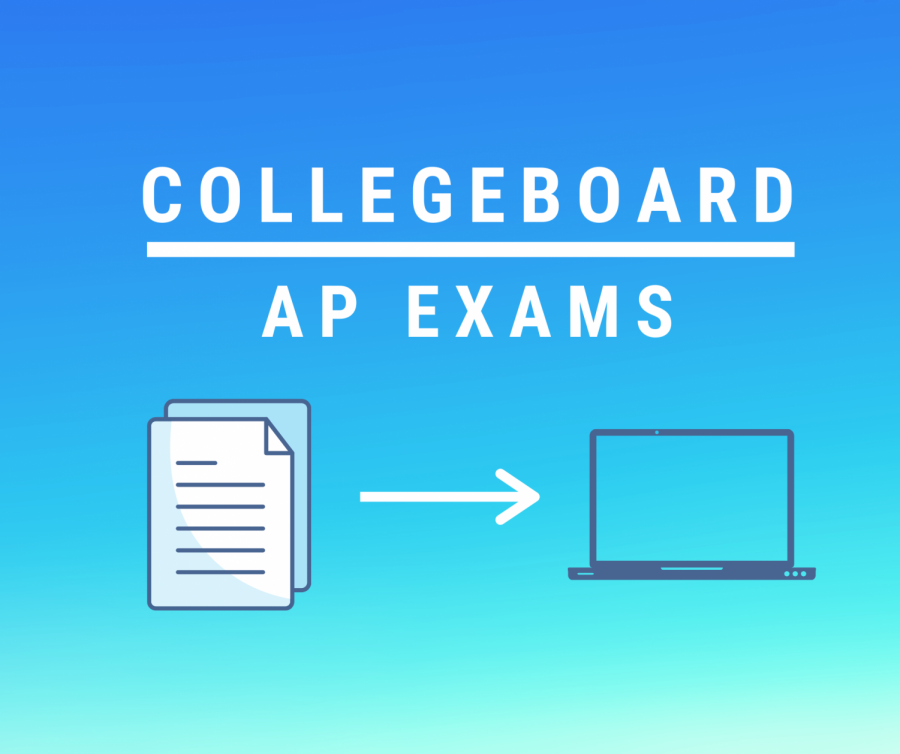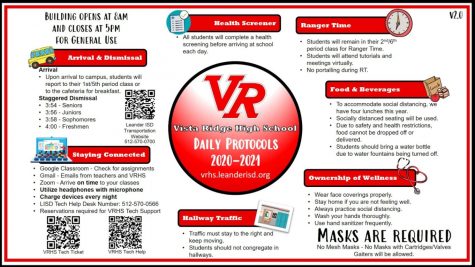COVID Changes Collegeboard AP Exams
April 13, 2021
Due to the COVID-19 pandemic and the vast majority of students participating in virtual learning, Collegeboard has created physical and digital tests for AP students this year. In addition to the changes to the tests, many AP teachers have also adjusted and changed their classes for the virtual learning platforms. Students are able to choose which version of the test they wish to take, and AP testing will start May 3.
“I don’t have any complaints about Collegeboard,” AP Chemistry teacher Lorraine Kyle said. “Collegeboard has been working hard to make sure students and teachers are informed about updates to testing. I think that they are doing the best they can to meet the needs of schools and students but still provide students with the opportunity to take a test that universities will accept and that covers the full scope of the course being tested.”
Students were able to choose which test they wanted to take on Total Registration with the exception of the AP Language and Music Theory tests which do not have a digital version available. The paper and pencil tests will be administered during the first testing window from May 3-17. However, as the vast majority of the student body attends from home, teachers are less sure, in comparison to past years, on how their students’ scores will turn out.
“Virtual learning has definitely made me uneasy as an AP teacher,” AP U.S. History teacher Michelle Maupin said. “When students were in my classroom, I felt I had a much better picture of where my students’ scores will land. In this virtual nature, sometimes I am not sure what is going on behind the screens. I have no doubt that the ones that have been present every day, shown maturity as a college student and worked hard will do just as well as my past students. I guess exam day will tell all.”
Last year, Collegeboard adapted its tests to a virtual platform and shortened the tests significantly as many students missed a portion of their curriculum due to the pandemic. This year, the tests will cover the full course content of the classes, and portfolios, which are due May 20, will require all the materials.
“Just like the rest of us, Collegeboard was thrown a curveball with COVID last year,” Maupin said. “Per last year, I think they were very fair in the fact that they trimmed the amount of content as a result of the unprecedented circumstances that threw every school into a virtual nature unexpectedly. Having your score based on only one essay in APUSH was a bit nerve-wracking, but I knew that my students were prepared.”
Paper and pencil exams will be administered at school in a large gym setting with adherence to social distancing guidelines. On the other hand, for digital exams, students and teachers will be able to access the exam application and practice resources to practice exam format beginning in April. Similar to Collegeboard adapting to a virtual platform, many AP teachers have also had to do the same.
“Unfortunately, I think many students have become disconnected from school and are really missing out on social interactions,” Kyle said. “The students are also missing the hands-on component of chemistry that makes it more interesting. I have had to resort to laboratory simulations or to videoing experiments. It is difficult to teach a laboratory-based course virtually. Not being able to see their faces and talk to students individually makes it much more difficult to judge whether or not the students are understanding the material.”
The digital exams will have security features to prevent cheating and an application browser that will not allow students to go back to previously answered questions or preview the test by moving forward to unanswered questions. Additionally, the tests must be taken on a computer, not tablets or smartphones.
“Most of my teachers are recommending that we take the test in person,” junior Nayeon Kim said. “I personally plan to take it in person because the online exams they are giving us this year do not let us go back and fix our answers. [Collegeboard] needs to fix their online tests. There are so many online proctoring tools and ways to make sure that online exams work out, but Collegeboard tests are ridiculously expensive and low quality.”
Collegeboard has identified the following exams as ones where the preferred format is in-person with paper: Calculus AB, Calculus BC, Physics 1, Physics C: Mechanics, Physics C: Electricity and Magnetism, Statistics, Chemistry. For many of the exams, the digital date available is not until the last week of school or until the month of June.
“I think any sort of math or science AP test is much harder than others because the material is super extensive, and it’s not easy to just learn overnight,” junior Ruth Martin said. “For this year, I am interested to see how the AP tests work because I thought they would be canceled or made shorter. Instead, it’s the regular test, which I wasn’t expecting at all.”
For the paper and pencil tests, administrators recommend for students to bring two number two sharpened pencils, two black or blue ink pens, up to two calculators if allowed on the test and a ruler for the physics test. Additionally, students who have approval from Collegeboard for testing accommodations will be permitted to use them on both the in-school paper version and at-home digital version test this year.
“I was in four AP classes last year, and I think Collegeboard used the best possible alternative they could’ve in light of an earth-shattering pandemic,” junior Ramya Nambala said. “I think they’ve tried their best to accommodate students given the extenuating circumstances this school year, as well. However, Collegeboard most definitely should have allowed refunds and cancellations, as condensing the exams was necessary, but not something the students contractually agreed to.”
The deadline for exam selection on Total Registration ended in March. However, students who are signed up for and miss a paper and pencil test will automatically be signed up for a digital test later in the testing window.
“This year has definitely been a disparate experience,” Nambala said. “Last year, learning was much easier because I could just absorb all the information my teachers would teach and enjoy class discussions. Virtual school isn’t as engaging and has overall been a disappointing experience simply because I can’t just talk in the classroom and work with peers as easily. I cannot wait for in-person learning.”
AP testing begins on May 3 and ends on June 10. Testing following the first administration window will all be digital. Any additional testing information and specific testing dates can be found on the VRHS and LISD Website and students can also contact Dean of Instruction Stacey Steele.







